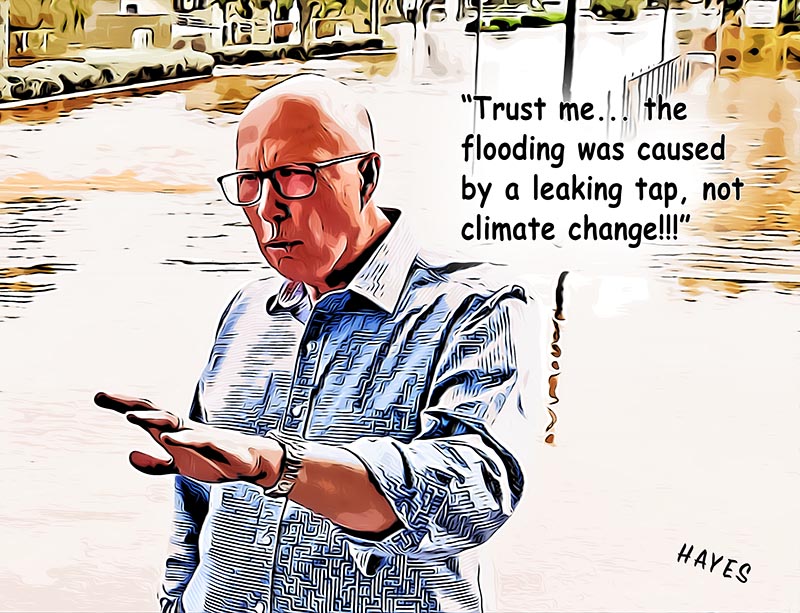

Where is the big C
in election campaigning
As the election shapes up, it has become very much about energy. But notably, unlike the 2022 election, ambitions for and debate about combating climate change have receded: climate change - the Big C - is ‘in the shadows’.
The next term of Federal Parliament will take us most of the way toward 2030 – the end of this critical decade for climate action. It means the policies Australians support at the upcoming election will play a pivotal role in the race to secure a safer future. Yet both major parties seem to be doing everything they can to avoid mentioning climate at all.
And Clive Palmer? His Trumpet of Patriots were been caught out with a misleading political advertisement on YouTube. It questions climate change using a clip taken from a 20-year-old documentary - it has been viewed more than 10 million times.
The scientist in the 2004 video said the clip was outdated and nobody from Clive Palmer's Trumpet of Patriots bothered to contact him before using it.n of Australia; a campaign of Trumpian far-right doctrine that has now come back to haunt him.

On climate change, Dutton’s scheme is to let the climate burn, let the mega fires burn, let the sea levels rise, let the heat become unbearable.
16 April 2025
ALAN HAYES
PALMER’S Trumpet of Patriots party has been criticised for spreading misinformation about climate change, and the link between human activity and temperature increases.
It has been variously reported in the media that Palmer has continually expressed scepticism about the extent of human impact on climate change, arguing that natural factors play a larger role than commonly acknowledged.
He has, instead, promoted the idea of building "carbon neutral" coal-fired power plants, suggesting that technological advancements can mitigate the environmental impact of coal.
Evidence has shown such an undertaking is fraught with significant challenges, with no guarantee of success – the only guarantee is that taxpayers would ultimately foot an exorbitant bill, so that the climate change naysayers can continue to play in furphy land.
So, do the Palmer's Trumpet of Patriots party really care? There’s a herd of climate deniers who still believe that Clive has been unduly criticised for spreading misinformation about climate change, and the link between human activity and temperature increases.
Like all climate deniers, however, they’ll continue to dwell in denial, a belief that Palmer has seized upon in his attempt to influence Australian politics into the MAGA doctrine.
Palmer, and his party, haven't hidden the fact they're trying to emulate Trump's policies, and that includes increasing the burning of fossil fuel.
A climate battle between Albanese and Dutton?
Anthony Albanese said the word “climate” only three times in his press conference on the day he called the election: once to promote his record of “meeting the challenge of climate change” and twice to criticise the Liberal Party. Opposition Leader Peter Dutton didn’t mention it at all. Yet in contrast, during the 2022 election campaign climate change, and the promises of a far more sustainable energy system, was the hottest topic to win the battle for Canberra.
Even though the early election battlegrounds were being fought on rising energy costs - and energy policy – those clashes were invariably divorced from the Big C. Not only has climate change be absent from the Coalition’s vernacular, Big-Nuclear-Man-Dutton has gone surprisingly silent on his plans to turn Australia into a mega nuclear power house.
Yet, not surprisingly, most voters still connect the rising cost of living and climate change. Why” Because their ever-spiralling electricity bills impact on their ability to maintain sustainability within the home – greedy energy providers get richer while Aussie families have less disposable income.
So, if Dutton is playing down his hitherto nuclear plan, what is he bringing to the election table? It wasn’t a Lolli-bag full of sweets that was to be his Big Government announcement - a major, huge, mega announcement with some truly head-spinning speculation thrown into the mix – as previously reported in the Grapevine - but an announcement that was flatter than a pancake.
As we previously reported, Dutton now has the space to freely MAGAfy Australia and propose policies that, just like the Trumpian lunacy, actively incentivise the increased burning of fossil fuels in Australia – his proposal for an east coast gas reservation scheme is now at the centre of his campaign.
But even Dutton’s fossil fuel scheme will do little to ease rising energy costs.
The gas miners, who pay little or no royalties and no tax on what they extract from the ground, will not be keen to reserve gas supply for the Australian market unless it is at world parity prices.
Self-wedging seems to be Dutton’s game plan, but like any structure that uses its own shape to maintain stability, when the cracks appear it collapses. And those cracks are already apparent. The most noticeable is that nobody knows what will happen under a Dutton government to the various framework institutions around climate change policy.
In particular, former NSW Liberal treasurer Matt Kean and his Climate Change Authority are in Dutton’s gun sights. Opposition finance spokeswoman Jane Hume has said, “I don’t think that we could possibly maintain a Climate Change Authority that has been so badly politicised”.
But amidst all of Dutton's rhetoric - and his claim that “You haven't seen anything yet, wait 'til we get into this campaign, and you see more of what we have to offer” – he still suggested that the Coalition would abandon Australia’s 2030 emissions target should it win the election.
Not to say the least, abandoning Australia’s 2030 emissions target would undermine the relations with our Pacific neighbours – nations that regard climate action as vital to their survival, and for whom Australia aims to be the security partner of choice.
Winding back Australia’s 2030 target – a 43% reduction in emissions, based on 2005 levels – would go against the spirit of the 2015 Paris Agreement. The deal requires countries to communicate national targets to cut emissions, and to set stronger targets every five years. No other country has wound back their climate targets, with the exception of Donald, the mad king of MAGAland. As he promised, Trump withdrew the United States from the Paris Climate Agreement, one of dozens of executive orders he signed in the hours after being inaugurated as the 47th president.
Just as worrying as the Mad King’s antics, is the Coalition’s energy scheme. It has been on the ‘burn’ since last year, and has been slammed by the Climate Council as nothing more than “a smokescreen for its commitment to coal and gas” and “radioactive greenwash”. It would delay Australia’s urgent and accelerating shift to clean energy and away from fossil fuels.
An analysis of Dutton’s scheme revealed that it has a gaping hole at its heart – little wonder Nuclear Man has gone hush, hush about nuclear being an integral part of their energy mix.
The truth, which Dutton wants to keep from voters, is evident: the winners from his proposed energy scheme have always been the Coalition’s mates - the multinational coal and gas corporations, who would keep polluting until well past mid-century. On the other hand, as a result of Dutton’s energy scheme, Australians will suffer from worsening unnatural disasters due to climate pollution and higher energy bills.
Voting to protect climate change
Since the Albanese Government first took office, Australia is now producing record renewable electricity and emissions are lower. But is this enough?
Most important, the Albanese Government has vowed to continue climate action despite the U.S. pulling out of the Paris agreement.
Although Trump’s move will impact the world, the current government says it will continue with its resolve to meet the challenges of climate change, which includes extreme weather events. So, why hasn't this become a centre and front issue of Labor’s election campaign?
It could be said that Peter Dutton’s campaign failure has given Labor heart - they will win without having to form a minority government. So, climate change is no longer an issue they need to push to win over voters.
There’s no doubt that the Coalitions biggest problems in the election campaign so far have come from poorly thought-through policies, and Dutton’s own indiscipline in failing to stay on message. But should that mean that Labor, who see themselves as climate change champions, go off track, too.
Richard Weller, of Climate Future, is urging every Central Coast resident to consider the ongoing impacts of climate change and make it a major election issue in the leadup to the May 3 federal poll.
“We dodged a bullet in the Black Summer Fires of 2020,” Mr Weller said.
“We may not be so lucky next time. We need to cut emissions, yes, but we must also prepare for the worst because climate change is causing more and more wildfires around the world.
“Australia has been wet for the last four years but our luck will most likely not continue with more hot and dry times in the future.
The Central Coast is extremely vulnerable to bushfire and we must be prepared.”
But do our politicians really care about the strong community feeling for their lack of climate change commitment in this election?
Dutton may have gone quite on his nuclear scheme, but only because it’s not a vote getter – his aspirations for a nuclear future haven’t gone away.
Labor may have gone quite on the Big C because they're now confident of winning. But is this reason enough not to woo the people with what is still a major concern?
Climate Council CEO Amanda McKenzie said about the Coalition's answer to the Big C, “Dutton’s scheme is to let the climate burn, let the mega fires burn, let the sea levels rise, let the heat become unbearable.”
Dr Jennifer Rayner, Climate Council Head of Policy and Advocacy said, “A political party without a real plan for cutting climate pollution can’t be taken seriously. Australians expect and deserve better. Australians know when they’re being sold a lemon.”
And despite all the pre-election beat-up that Australians care more about the cost of living than climate change, polling has consistently shown that a majority of Australians are concerned about climate change, and want politicians to act on this issue.
This election, there’s a choice to make: political parties can listen to what Australians want and build on the progress that’s being made in rolling out renewable power and clean transport, or risk going backwards and locking in ever-worsening extreme weather.








.jpg?crc=4257584689)










_web.jpg?crc=282450513)



